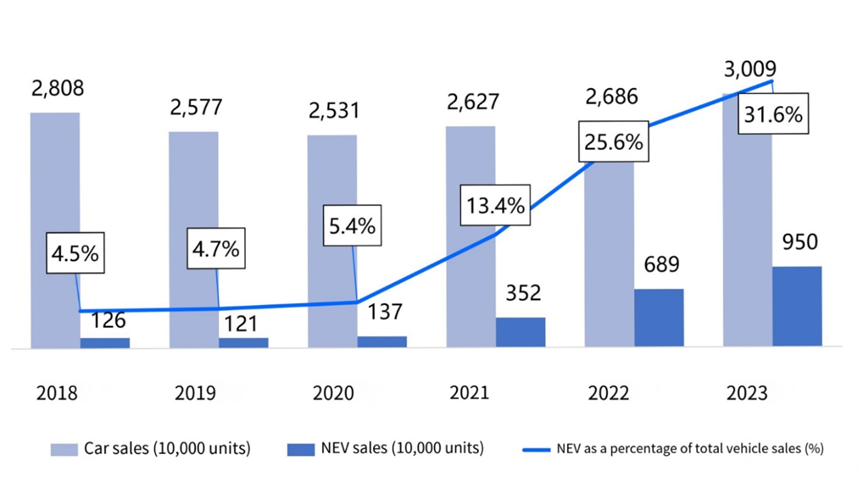Your gasoline vehicle about to be phased out? : The irresistible and rapid progress made by the new energy vehicles in worldwide!
With the international market paying more and more attention to the development of green economy, the reform of traditional vehicles has become a foregone conclusion.
"Starting in 2035, all cars sold in
the European Union will be zero-emission vehicles. European Union member states
gave final approval Tuesday to a plan that would require all new cars sold in
the EU to be zero-emission vehicles starting in the year 2035." -
Hernandez, Joe. "All New Cars in the EU Will Be Zero-emission by 2035.
Here's Where the U.S. Stands."
The clear upward trend
The International Energy Agency (IEA)
released the "Global EV Outlook 2023," showing an exponential growth
in the global electric vehicle (EV) market. Sales surpassed 10 million units in
2022, with a penetration rate of 14% (compared to approximately 9% in 2021 and
less than 5% in 2020). The IEA predicts that electric vehicle sales will
continue to grow strongly in 2023, reaching 14 million units by the end of the
year, a 35% increase compared to the previous year.
China, Europe, and the United States rank
as the top three in global electric vehicle sales, with China leading the pack,
accounting for approximately 60% of global electric vehicle sales. Europe is
the second-largest market, with sales growing by over 15% in 2022. The United
States, as the third-largest market, saw a 55% increase in electric vehicle
sales in 2022, with a penetration rate of approximately 8%.
The latest data for 2023 reveals that China's total automobile sales reached 30.09 million units, with New Energy Vehicle (NEV) sales reaching 9.5 million units, representing a 37.9% year-on-year increase. This demonstrates China's significant role as a key driver of overall automotive sales.
Why phase out traditional vehicles?
Since 2016, various regions and countries
around the world have begun proposing the cessation of driving traditional
fuel-powered vehicles. In 2017, the Deputy Minister of the Ministry of Industry
and Information Technology of China announced that China was studying the
gradual phasing out of fuel-powered vehicles. As the world's largest automotive
market over the past decade, China's statement undoubtedly stirred up waves.
Gradually phasing out all gasoline and
diesel vehicles would greatly benefit China. Firstly, 70% of China's crude oil
demand needs to be met through imports, with automobiles accounting for 42% of
this consumption. Gasoline and diesel vehicles also have a significant impact
on public health, being one of the main culprits of air pollution in many
Chinese cities. With the increasing number of automobiles in China, the
increase in oil consumption has also exacerbated China's greenhouse gas
emissions.
Environmental pros and cons
Research from the Energy and Transport
Innovation Center has found that if implemented according to schedule,
greenhouse gas and air pollution will be significantly reduced. A study from
the China Automotive Technology Research Center found that by gradually phasing
out gasoline and diesel vehicles, nitrogen oxides would decrease by 41% by 2050
compared to 2017, and particulate matter emissions would decrease by 35%.
According to research from the Energy and Transport Innovation Center, end-user
greenhouse gas emissions will decrease by 51% by 2040 and 77% by 2050, while
considering the entire lifecycle (including greenhouse gas emissions generated
during electricity generation), greenhouse gas emissions will decrease by 55%
by 2050.
However, electric vehicles themselves are
not without environmental hazards, especially as concerns have been raised
about battery supply. Currently, due to the wide variety of battery types,
recyclers are unwilling to take on safety risks, resulting in a low battery
recycling rate. If a better recycling system is not established, lithium,
cobalt, and manganese in batteries could cause significant harm to public
health and the environment.






评论
发表评论